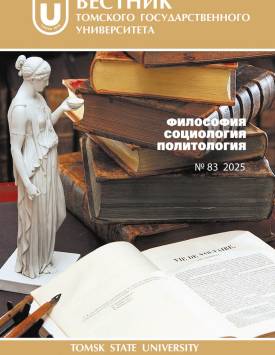Epistemological prospects in the development of softwarization of contemporary scientific research activities
Currently, software is becoming an important tool (agent) for obtaining and systematizing knowledge in many disciplines (physics, astronomy, bioinformatics, chemoinformatics, ecoinformatics, mathematics, epidemiology, social and human sciences) and industries (pharmacological, biotechnical, chemical and agricultural); it also often serves as a representation of knowledge. The active use of software is becoming an important component of modern research practices leading to their significant socio-technological transformation, which is called the softwarization of scientific research activities. Over time, it becomes the ethos of science and, in this status, strives to expand its further influence on various disciplines and industries. The essence of the softwarization of scientific research activities lies in the assumption that scientific knowledge can be generated not only through the work of human thinking, but also during the functioning of software, which gives rise to many thoughts about its role in the scientific process. To identify epistemological prospects for studying the role of software in the scientific process, the article examines the development stages of the softwarization of scientific research activities as a cognitive entity, an intellectual and epistemic agent. So, the epistemological prospects for software development in contemporary scientific research activities lie in several trajectories for research: (1) in studying the increase in the epistemic status of scientific software from a “tool” to a “cognitive entity”, from an “intelligent agent” to an “epistemic agent”; (2) in clarifying the definitions of the concept “alien intelligence” in the context of contemporary research activities softwarization, new types of knowledge and criteria of truth for research results using software; (3) in studying the emergence of hybrid and new, non-human (non-anthropocentric or, in particular, machine-oriented) modes of research and the emergence of the contours of the fifth paradigm for the development of scientific methods. The author declares no conflicts of interests.
Keywords
alien intelligence, epistemic agent, software based on artificial intelligence technology, intelligent agent, cognitive essence, softwarization of scientific research activitiesAuthors
| Name | Organization | |
| Zhuravleva Elena Yu. | Russian Academy of National Economy and Public Administration | zhuravleva-ey@ranepa.ru |
References

Epistemological prospects in the development of softwarization of contemporary scientific research activities | Tomsk State University Journal of Philosophy, Sociology and Political Science. 2025. № 83. DOI: 10.17223/1998863X/83/2
